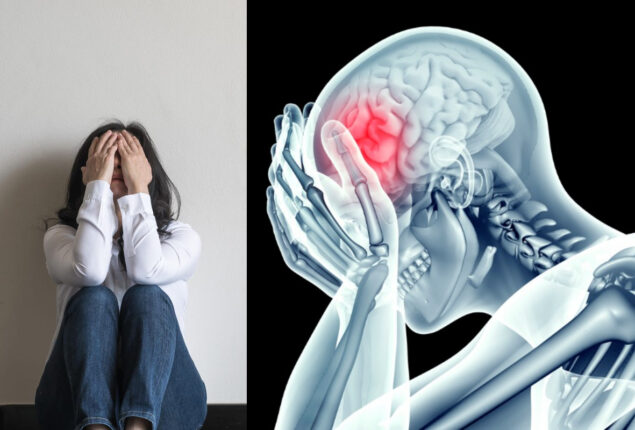WHO assures to provide essential healthcare services in flood-affected areas
World Health Organisation’s Country Representative in Pakistan Dr Palitha Gunarathna Mahipala said...

US capitalism is detrimental to Mental Health Day
I started having severe panic attacks in the late 1990s when I was attending high school in Texas and exhausting myself with extracurricular and academic activities.
The first cycle lasted six months, during which time I constantly felt out of breath, my pulse rate was racing, and I had the sense that I had been ripped from reality and transported to a parallel, horrific dimension where I was all by myself and no one would be able to assist me.
The idea that I was dying or otherwise failing badly at existence added to my dread because I had been nurtured in the brutal system known as American capitalism, where the demand for individual success had been encoded into my brain.
I got a professional psychological evaluation when the panic episodes returned a few years later while I was attending college in New York, where hyperventilating in the restroom quickly proved incompatible with attending lectures. Just 90 seconds were required by the doctor before heavy-duty anxiety medicine was prescribed.
As a result, I momentarily joined the group of Americans who use medications to treat mental health problems brought on by, well, the US.
My post-college rejection of the US in favour of foreign wandering taught me that the world didn’t have to be such a hostile and alienating place, even though I couldn’t explain at the time why my own country frightened me so much.
The corrosive culture of rivalry and soul-crushing consumerism that passes for life in the US was replaced by an energising sense of human community, whether I was offered a ride while hitchhiking in Lebanon or given a place to sleep by peasant farmers in Colombia. I gave up my anxiety medications.
Other nations undoubtedly experience problems as well, and the majority of people do not enjoy the enormous privilege of resolving their psychological troubles by travelling the world.
But as we observe World Mental Health Day on October 10, it’s important to consider the risks to mental health posed by the increasingly internationalised version of neoliberal capitalism practised by the US.
The nation is experiencing a “historic mental health crisis among people of all ages,” with two out of every five adults reporting symptoms of sadness or anxiety, according to a White House fact sheet published in March 2022. The coronavirus pandemic has significantly worsened the state of mental health in the country, even if the pre-pandemic status was already dire.
For instance, 50 per cent of female students and one in three high school students in 2019 reported having “chronic feelings of melancholy or pessimism.”
While their incidence of mental diseases is rising, the fact sheet highlighted that “Black and Brown’s populations are disproportionately undertreated.” This sounds pretty much like business as usual in the ostensibly egalitarian “country of the free.” Of course, institutionalised prejudice and widespread racial incarceration also have a negative impact on mental health.
The White House emphasised that online platforms should “be obliged to prioritise and protect the health, safety, and well-being of children and young people above profit and revenue” in light of the detrimental psychological impacts of social media.
The US government is intrinsically bound to the capitalist system, which actively seeks to extract corporate profits from the misery and suffering of people. This system prioritises profit over human health and well-being. Ask the pharmaceutical business, please.
Simple is the formula. By working to destroy solidarity—the very foundation of humanity—and turning the right to physical and mental health care into an exclusive and expensive endeavour, neoliberalism breeds psychological distress. This situation only makes mental health stressors worse for people with lower socioeconomic status.
This is not to imply that wealthy individuals do not experience psychiatric illnesses. CEOs are disproportionately prone to be psychopaths, according to several research.
Additionally, US drug companies have promoted pathologizing psychological distress as an individual defect rather than an outcome of societal context, despite the fact that depression, anxiety, and despair are entirely rational responses to an inhuman environment and a world that capitalism is rapidly driving towards ecological annihilation.
In a similar vein, the arms industry, another pillar of US capitalism, feeds a cycle of profitable catastrophe that destroys communities both at home and abroad while waging war on empathy.
Psychiatrist Anna Zeira of Baltimore spoke about the unsettling effects of the US’s neoliberal capitalism, which is characterised by extreme inequality and the “disempowerment of workers,” on mental health in a 2021 peer-reviewed research paper. She stated that deaths from drinking and drug overdoses, as well as suicides, have all “dramatically increased” in recent years. In fact, there was a 73 per cent rise in Black youth suicide attempts between 1991 and 2017.
Zeira recounted how certain American doctors labelled Black males who demanded racial justice during the Civil Rights era as “delusional and paranoid.” Her argument is that those who object to the “status quo” are frequently “identified as mentally sick.”
This October 10, as capitalism continues to wreak havoc on mental health in the US and everywhere, it’s imperative to recognise that the current situation is not merely anomalous, but also dangerously ill.
Catch all the Health News, Mental Health News, World News, Breaking News Event and Latest News Updates on The BOL News
Download The BOL News App to get the Daily News Update & Follow us on Google News.